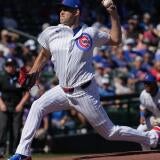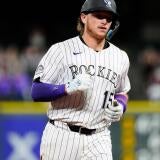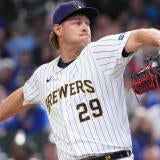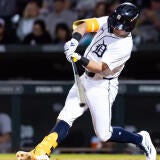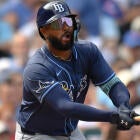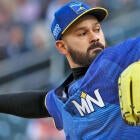Fantasy Baseball Regression Alert: David Dahl, Javier Baez and five more hitters bound to regress
Heath Cummings looks closer at seven hitters who are most likely to regress from their current production.
Regression is a term we've co-opted in a lot of different ways in sports coverage.
It's also a term that causes a lot of people to comment and tell you you're using it wrong. But most importantly, it's a good way to describe which fast (or slow) starts you should buy (or sell). But to save a few of you from commenting, he's a quick breakdown of what I mean:
Regression can move positive or negative. For the most part, I'm talking about hitters who will either regress back towards career norms or closer to league average in things that are at least partly out of their control. Sometimes that means they'll be worse than they have, sometimes it means they'll be better.
Also, regression is often relative. Saying a great player is going to regress doesn't mean he won't continue to be great. It certainly doesn't mean we think he's actually bad.
With that in mind, let's get to the regression candidates:
David Dahl was a near consensus breakout pick entering the season, and why not? He entered the season with a career .859 OPS and looked to finally have a full-time job playing half of his games in Coors. But even if you ignore yet another injury, he's been massively disappointing. Thankfully, some of that has been masked by ridiculous batted ball luck.
Dahl leads all of baseball with a .443 BABIP this season yet somehow has a somewhat disappointing .297/.343/.484 slash line. He's struck out in 34% of his plate appearances and his ground ball rate is back over 40%. There is little doubt his BABIP is going to plummet, possibly up to 100 points. If his approach doesn't change before that happens, he's not going to be a startable outfielder in three-outfielder leagues.
This is going to seem ridiculous to those of you who read my bust column. Yes, so far I've been incredibly wrong on Javier Baez. That's not going to stop me from telling you that 2019 Baez doesn't look sustainable either.
I didn't believe the 24.3% HR/FB rate over a full 2018 season, so I'm not yet buying into 25.6% in 2019. I questioned if he could truly hit .290 again with a 25.9% strikeout rate, so I'm certainly not going to believe a .319 average with a 28.8% strikeout rate.
In fairness to Baez, the hard-hit rate and average exit velocity are both up again this year, so there may be more power than I expected. But I'd still bet on a significant amount of regression, especially when it comes to batting average. The triple eligibility makes Baez one of my favorite sell-high candidates of the season.
OOK, I need to clarify the importance here. Because I'm pretty convinced Cody Bellinger is going to be awesome. He's my No. 1 first baseman. The improvements he's made in his strikeout rate combined with his propensity to crush the ball when he makes contact make him look like one of the best hitters in the game. But I'm not going to fully buy into a .405 BABIP or a 33.3% HR/FB rate. And I do think it's likely the K rate creeps up a little as the year goes on.
So how is this actionable? Well, I'd still rather have Mike Trout or Mookie Betts from this point forward.
Like most of the players on this list, I do believe Joey Gallo is very good. But he's not this good. For two years I've moaned about Gallo's ridiculously low BABIP and what it was doing to his batting average. I really thought he could put together a .230 or .240 average which, with his power, would make him must-start in all formats.
Well, Gallo finally found some batted ball luck. A little too much, to be honest. He owns a .388 BABIP (107 points higher than his career average) which has boosted his average all the way up to .277 and made him one of the best hitters in baseball. He's also mashed homers at a rate that's high even for him. Gallo's career HR/FB rate is 30.1%, which is ridiculously high. This year he sits at 41.9%. Part of that is because he has a 96.7 mph average exit velocity, but it's still not sustainable.
While I do think this is the best version of Gallo we've seen, it's just not fair to expect he'd keep this up.
There was a lot of talk (specifically from me) about how J.T. Realmuto could take another step forward with his move to Philadelphia. Instead, he's been largely the same player he was with the Marlins. In fact, a worse version than the player we'd seen the past two seasons, but I don't expect that to continue.
Realmuto's expected batting average is .304, per Baseball Savant. His expected slugging percentage is .513. His average exit velocity is higher than it's ever been, as is his hard-hit rate. His barrel rate and line-drive rate are both career bests.
Every piece of information we have suggests Realmuto should be even better than he was in 2018. He certainly shouldn't be worse.
If you look at Justin Turner's numbers you might think Father Time is starting to catch up to him. He's striking out a little more often, his ISO is the lowest it's been since he joined the Dodgers, and his ground-ball rate has ballooned. I'm not so sure you should be worried.
Turner's barrel rate, average exit velocity and hard-hit rate are all at or above what he's posted recently. In fact, it kind of looks like he's already breaking out of what was simply a cold start. Since April 26 he owns a .309/.390/.603 slash line.
I'd happily buy Turner from anyone who thinks he's over the hill.
Like Turner, Robinson Cano's numbers are underwhelming at first glance. He has the highest K rate of his career and the lowest ISO. He also has a 7.3% HR/FB rate, which is about half of his career mark. His batted ball data is still acceptable, he's just chasing more often and not making contact as often. Struggles can lead to pressing, and maybe that's what's happening, but I'd bet on Cano's power numbers bouncing back sooner rather than later.
Second base is still a very weak position, and a lot of people are considering dumping Cano on the waiver wire. If you see that and have a need at the position, pick him up.










